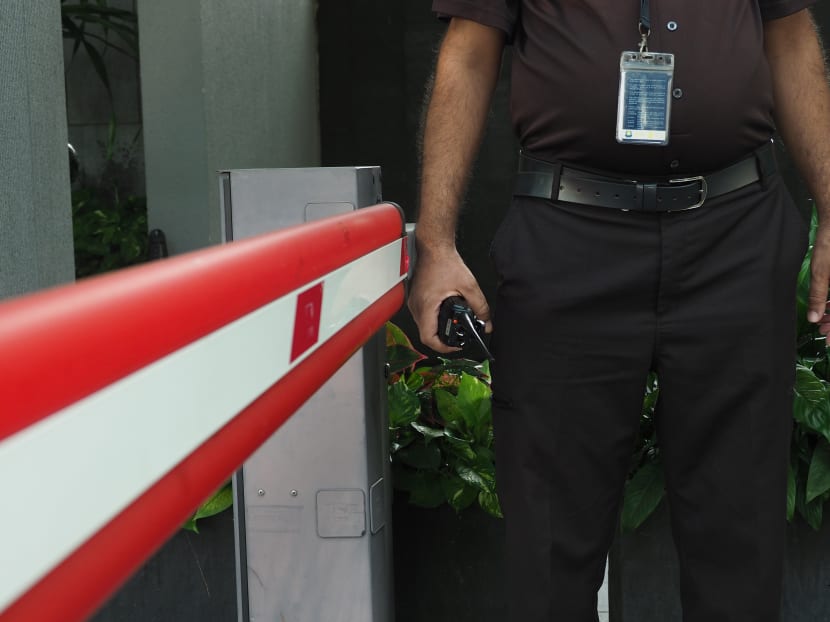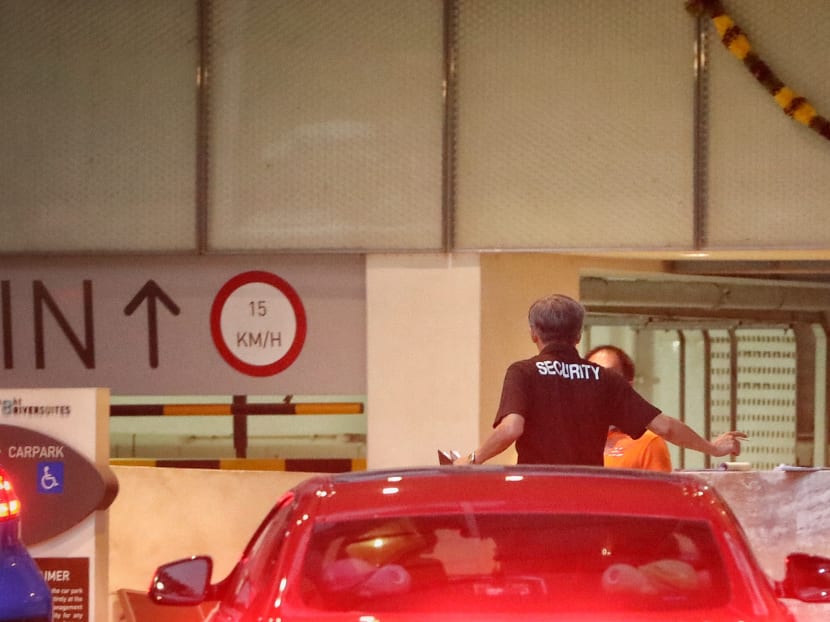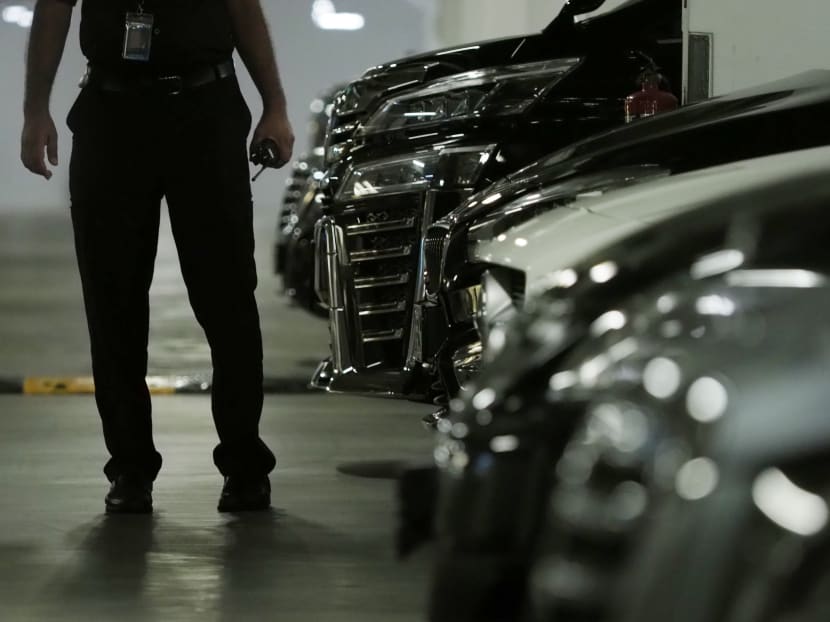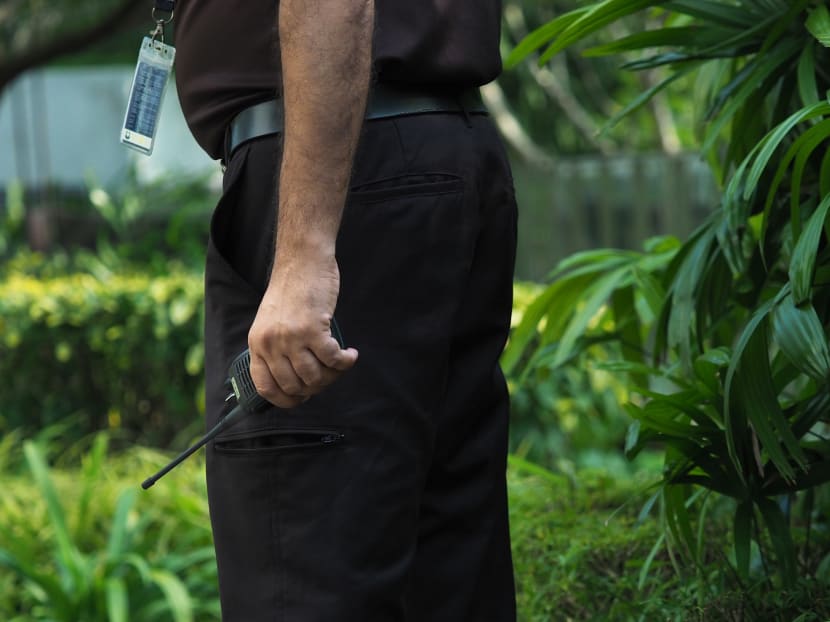The Big Read: From rude residents to ‘unfair fines', condo security guards have a lot to put up with
SINGAPORE — TODAY’s interviews with condo security guards found that they are often treated with little respect all round — not just in their day-to-day interaction with residents but also in terms of how they are expected to carry out their work, with the condo management policing their behaviours with fines.

At some condominiums, security guards and their agencies are punished for things as trivial as failing to ensure that cars are parked within the designated line markings, and not responding quickly enough to WhatsApp messages from the condo management, for example.
SINGAPORE — Eric (not his real name), 44, works as a security officer at a condominium in Marine Parade.
He needs to have his mobile phone with him at all times and make sure that he responds, within five minutes, to messages from the condo management in a WhatsApp group chat. He also has to make sure that cars in the condo are parked within the designated line markings, and “not on or over the lines”.
Otherwise, his security firm might end up paying “liquidated damages”, or fines, as those in the industry calls them. In August, Eric’s firm was fined twice.
Once, when technicians came to the condo to service its lifts and he did not respond in time to a WhatsApp group chat message about the servicing. “With only four of us working that shift, we were also busy with our own duties,” he said.
On the other occasion, the condo management saw a car that was not parked properly. “We did not clamp the car and the management spotted it before us,” said Eric.
He added: “Once management spots any cars on the lines, or blocking the cars beside them, they will take pictures and send to the group chat. We will try to find out (who is) the car owner, which would take some time because there are over 500 cars registered. If we can’t find their phone numbers, we would have to (locate) the unit (where the owners are living) to inform them.”
He told TODAY that on average, his security firm has to pay liquidated damages at least once a month. Each fine is either S$50 or S$100.
Last month, his firm was penalised six times and made to pay S$300 to the condo management. At the condo where he works at, the fines are also meted out if the security officers are late for their shifts or if the lifts are not barricaded properly when they are being serviced, for example.
The practice of liquidated damages is meant to protect a property from damages but union and industry leaders said it has been misused as fines to police the behaviour of security guards, or make them carry out tasks which they are not supposed to do.
On Oct 31, the Union of Security Employees (USE) spoke out against the “peculiar practice”.
“Very often, the liquidated damages in the security industry are more like fines than actual reimbursements for damages suffered,” the union said in a Facebook post.
It added: “In many instances, security agencies often have to contend with liquidated damages should their officers not carry out actions against illegal parking or other rules like screening of visitors or even where visitors dropped off. Putting out a contract at a certain fee, and then imposing liquidated damages to claw back some of the contract sums do not seem fair.”
Such fines range from tens of dollars to a few hundred dollars for each incident, the union noted.
Speaking to TODAY, USE general secretary Raymond Chin reiterated that such a practice is a “misuse” of liquidated damages to “govern behaviours of the agencies”.
“Liquidated damages should be imposed if there are actual losses suffered. It should not be used as a form of financial punishment or worse, to get ‘discounts’ off the security agency in a roundabout way,” he said.
USE executive secretary Steve Tan said he has seen cases where security firms lose money since the liquidated damages imposed on them are higher than the sum of the contract. For example, there was a case where a firm had to pay more than S$27,500 in liquidated damages in a month, he said.
Adding that the practice has even seen some security agencies penalised for “poor handwriting”, Security Association Singapore executive director Ikhsan Suri described the use of liquidated damages as a means of control over security officers, and making them work beyond their job scope.
“A typical unfair clause is one which gives managing agents absolute discretion to dictate officer’s actions or tasks, and which has been used to get security officers to do all sorts of non security-related tasks like electrical work, putting up signages and notices — which is typically in fact the managing agent’s job — or checking water meter readings,” he said.
The plight of security officers — who often work long hours for relatively low pay and receive little recognition from the very people they serve — is back in the spotlight after a video, showing a resident of Eight Riversuites condominium in Whampoa verbally abusing a security guard, went viral late last month.
The incident has prompted Members of Parliaments to renew their calls for harassment laws to be extended to cover private security officers.

TODAY’s interviews with condo security guards found that they are often treated with little respect all round — not just in their day-to-day interaction with residents but also in terms of how they are expected to carry out their work, with the condo management policing their behaviours with fines.
And sometimes, the rules that they have to follow are as questionable as the by-laws which they are made to enforce on residents, said industry players.
In Singapore, security firms are typically hired by managing agents of condos to take care of security arrangements. The managing agent, in turn, answers to the management council — a body elected among residents to administer the day-to-day running of the estate.
Under the Building Maintenance and Strata Management Act, management corporations — which comprise all unit owners within the development — are given the powers to manage their own estates. A management corporation is also known as Management Corporation Strata Title (MCST).
ALL IN A (ROUGH) DAY’S WORK
On his job scope, Eric said that his tasks range from registering visitors to the condo, ensuring that residents wear proper swimming attire in the pool to keeping the premises safe.
This is usually the situation in most condominiums, where security officers have to multi-task, on top of protecting the premises and residents, as well as upholding the estate’s by-laws.
And wearing many hats while carrying out their duties often put the security officers in the direct line of fire on a daily basis, as they have a tough time enforcing the estate’s by-laws in the face of resistance by difficult residents.
Another security officer, Leonard (not his real name), 54, who is stationed at a condominium in Tanglin area, said he has had visitors pick fights with him when he tries to enforce the condo’s by-laws.
Both Leonard and Eric agreed to speak to TODAY on condition of anonymity, as they were not authorised to speak to the press and could get in trouble for doing so.
Recounting the incident, Leonard said: “We stopped a visitor from entering the condo because she did not register her details. But on her next three visits, she did not register as well so we had to inform the tenant whom she visited… She came with her husband the next day and he scolded us.
“He shouted at us, ‘Don’t disturb my wife and ask her so many questions’. We tried to explain to him that this was our duty but he got out of his car and said to me: ‘This is your last warning’. So I just apologised.”
Security guards, along with other low-wage workers such as cleaners, gardeners and petrol station attendants, were once described by veteran diplomat Tommy Koh as “invisible people” who are not shown respect by the elite.
A small scale survey of 52 security guards conducted by the USE in April found that about two-thirds had experienced verbal abuse, while less than a handful were physically abused.
Several of the security officers whom TODAY spoke to also said they have been verbally abused while on duty, but they felt that it was part and parcel of the job.
SMS Investigation and Security director John Sng noted that security officers are “sandwiched” and are made messengers of bad news.
His agency currently works with 24 condos. On average each month, he sees about four cases of abuse.
“Most of the cases revolve around disagreement about the rules. For example, MCST clamps their cars so the residents go after officers,” he said.
He cited an incident where a resident who was upset with the going-ons at a condo parked his car in front of the car park gantry and refused to move.
“When security officers tried to ask him to move, the resident said, ‘I don’t have to talk to you, you are just a security guard’. When the police came in, the police said it was a private matter. So there was no support from the police and MCST side,” Mr Sng said.
Mr Ikhsan said that without the force of law, security officers get “bullied” while trying to enforce a condo’s rules.
He said: “These members of the public believe they can get away with it because security officers do not have the special protections despite being in a vulnerable front-facing position. Often incidents of abuse or harassment of security officers do not go punished as they do not get support from the building owners or MCSTs or managing agents.”
Mr Robert Wiener, president of the Association of Certified Security Agencies (ACSA) and director of Prosegur Security, said he sees an average of almost 30 cases of abuse per day. He noted that some of the security officers involved may even get sacked for trying to enforce the rules.
“The MCST doesn’t want to pick a fight with the owners of the condo. So these security officers are not supported even though the condo owners or MCST said that they have to… make sure that these rules are abided by,” he said.
“But when they clamp a car and the owner asks, who did this, the security either gets praised or pulled off.”
Mr Ikhsan stressed the need to “empower security officers by ensuring they have sufficient support to do their jobs and (seek) recourse in incidents of abuse”.
“Since the managing agents and MCSTs are generally not supportive of security officers, the union and security associations are now stepping up our support of security officers and security agencies,” he said.
STEMMING ABUSE
To reduce the likelihood of a confrontation between angry residents and security guards, USE’s Mr Chin suggested better-designed security procedures, clearer rules and the use of technology.
In a bid to reduce the number of abuse cases, the security officers in Mr Sng’s firm now wear body cameras.
“I did it about three years ago and got the idea from an Australian security association. They said that this was used as a deterrence. I tell my officers, if they are (facing) a conflict situation, to tell the parties involved that they are being recorded,” he said.
Still, despite the effort, he estimated that fewer than half of the residents would heed the instructions given by security officers.
Following the Eight Riversuites incident, the Security Industry Council (SIC) earlier this week launched an email helpline (stopabuse [at] hormatsecurity.com) for private security officers to report cases of verbal and physical abuse which they encounter while performing their duties. Assistance provided could range from legal advice to medical claims or requests to change deployment site.
Mr Wiener believes that on top of public education, legislation is also needed to protect security guards.
Many in the industry have been calling for private security guards to be accorded the same legal protection as public service workers such as nurses.
In response to TODAY’s queries, the Ministry of Home Affairs said that the harassment of anyone, including security officers, is “unacceptable” and an offence under the Protection of Harassment Act. Where there is violence or disorderly behaviour involved, victims are also protected under other legislation such as the Penal Code or the Miscellaneous Offences (Public Order and Nuisance) Act, the ministry said.
AN UNDERLYING PROBLEM
Beyond the day-to-day challenges which condo security guards face, there are underlying problems that often leave them getting the short end of the stick.
These include the issue of liquidated damages, which refer to a fixed or determined sum of money agreed by the parties to a contract to be payable should there be a breach by any party.
USE’s Mr Tan said the imposition of liquidated damages became a standard industry practice likely as a result of the manpower crunch. As the security services are often bought on the basis of headcount, buyers use liquidated damages to ensure that that there is no shortfall of manpower for example, he said.
Mr Francis Chng, the director of security firm Horus I, said that these days, some contracts stipulate that if a security guard misses a checkpoint during their patrol, the security agency would be made to pay liquidated damages.
But he noted that a security guard could miss a checkpoint due to carelessness, and it does not necessarily mean that the guard did not do his rounds. “Missing a (checkpoint) does not actually cause damage to the estate,” he pointed out.

SAS’ Mr Ikhsan cited a case of a condo in Bukit Panjang, which required its security guards to conduct patrol of its premises with more than 20 checkpoints — over half of which were outdoors. Liquidated damages of S$50 were imposed for each checkpoint missed, even on the occasions when it was raining, he said.
Reachfield Security and Safety Management general manager Grace Lim said that security firms also are penalised under the liquidated damages when guards are caught resting on the job.
“Some clients want a S$200 levy per (instance of a security officer caught resting on the job) instead of having a warning system, where there is a verbal warning first, followed by a written warning, before finally resorting to liquidated damages,” said Ms Lim.
Mr Ikhsan reiterated that managing agents are not well versed in contracting practices and do not have a strong grasp of how liquidated damages work.
“Managing agents and MCSTs often include liquidated damages clauses that are unfair and almost definitely unenforceable if challenged in court,” he said. “They are almost always based on how ‘serious’ the managing agent or MCST thinks each alleged breach is, without any regard for the actual damage suffered by the client, which is the basis of liquidated damages.”
THE PERENNIAL MANPOWER CRUNCH
Faced with an array of issues, it is no surprise that the industry is facing a manpower crunch. Nevertheless, following various initiatives to increase the appeal of the job, the situation has improved slightly in recent years.
In 2017, the Government accepted recommendations by Security Tripartite Cluster which called for the basic pay of security guards to increase by around S$300 between 2019 and 2021. After that, they will receive an annual basic pay increment of at least 3 per cent.
All security guards will also be allowed to put in a maximum of only 72 overtime hours a month. The current practice — where security companies apply for overtime exemptions so that their employees can work past this limit — will be discontinued from 2021.
The higher basic pay and subsequent annual increments were aimed at offsetting the cap on overtime hours. Security agencies had to adopt the recommendations from the start of this year.

Between 2015 and last year, the number of security officers with valid licences has increased from 73,700 to 79,800. As of September this year, the figure was 79,200.
Despite the overall uptick, the industry still needs more bodies. Mr Wiener estimates that the industry may be facing a shortfall of about 12,000 workers. The use of technology will help to reduce the reliance on manpower and alleviate the manpower crunch over the next five years, he said.
During the Security Industry Conference last month, Ms Sun Xueling, Senior Parliamentary Secretary of Home Affairs and National Development, noted that security agencies “find it difficult to fill vacancies amidst slowing workforce growth and competition for workers from other industries”.
She said: “We have a rapidly ageing workforce. More than half of our current pool of security officers are above the age of 55.” Referring to the removal of the overtime exemption, she said that this would create “even greater pressures on the supply of manpower”.
Mr Chin, the union leader, stressed the need to transform the industry from its present manpower-intensive, low productivity state to attract younger people.
“We need to transform the job into one which is based on strong security outcomes and using the right ‘tech-man’ mix to make this an attractive career choice,” said Mr Chin, referring to the use of technology to supplement manpower.
At the same time, security firms TODAY spoke to highlighted the value of older and more experienced security guards.
USE will be rolling out a digital adaptation course for officers who are not tech savvy. It hopes to “transform the security occupation into a career of choice, and anyone who is able to do the job and is willing to, cannot and shouldn’t be prevented from taking up the job”, said Mr Chin.
Under the Industry Transformation Map for the sector, which was launched in February last year, the Government is also looking to enable the security industry to leverage technology and raise the skills of its workers. The blueprint aims to enhance regulatory standards, promote greater use of technology and improve career progression.
OUTCOME-BASED CONTRACTS — THE WAY FORWARD?
To tackle the root cause of the perennial issues plaguing the industry, many have called for the use of outcome-based contracts.
Ms Sun, for example, stressed the importance of such contracts in her speech at the Security Industry Conference. “When contracts start by stipulating the outcome and not merely specifying a certain number of security officers, security agencies are free to think of how technology can be used to augment manpower, and start providing integrated security solutions,” she said.
Currently, buyers put up a tender for services based on a fixed number of headcount under manpower-based contracts. Outcome-based contracts would not be as manpower-reliant, as security firms are assessed on expected performance levels and technological solutions can be used to offset a lower headcount.
The Government has announced that from May next year, all of its agencies will be adopting outcome-based contracts for all new security contracts.
Mr Chin said that security service buyers will need time to get onboard but the Government’s move will send a strong signal.
“(Manpower-based contracts) have been the default manner of calling contracts and are also simple to understand and execute,” he noted. He added: “It’s a very big change in the industry — cutting the manpower and using performance as an indication.”
Outcome-based contracts may also see buyers incurring “more costs in the short term for security consultation and also upfront capital expenditure on buying the tech equipment and solutions”, he added.
Tripartite partners — consisting of the union, employers and the government — have agreed to train more consultants at the Security Industry Institute to help buyers draft outcome-based contracts.
Mr Chin noted that currently, buyers are apprehensive about substituting technology for manpower. “If they want five security guards, they mean five. Even though we may propose that we are giving you three but some tech (solutions) to cover other grounds, they are a bit hesitant — they would rather have five guards than three,” he said.
The MCSTs and managing agents whom spoke to TODAY cited several reasons for the resistance to outcome-based contracts, such as longer contractual commitments.
Mr Chan Kok Hong, managing director of Savills Property Management which manages over 100 condos in Singapore, said that he knows of five which have taken up outcome-based contracts over the past year.
Mr Chan is also president of the Association of Strata Managers, which seeks to represent managing agents for condos in Singapore. He said that outcome-based contracts have not caught on because of the long period of commitment required from the buyers, due to the installation of equipment and technology.
“When you are trying something new and you can’t just terminate (the security services) unless you are ready to bear the costs, there is a risk. If you are on the (condo management) council and you sign a three-year contract, and in six months time you realise the hardware is not working properly or the guards are not good, then you are stuck,” he said.
A spokesperson from the Association of Property and Facility Managers said that there may also be different interpretations of the optimum outcomes by the parties involved.
“It is not uncommon for the outcomes in an outcome-based contract, however well articulated, to be interpreted differently by different persons. As such, problems can arise from the measurement of outcomes and/or ‘fair’ administration of the contract,” said the spokesperson.
Mr Andrew Lioe, director of property, strata and facility management company A4 International, which oversees about 60 estates and commercial buildings, said that some of his clients still prefer the physical presence of security officers.
This is so because they “act as a better deterrence” compared to having closed circuit television cameras or supervision from a remote security centre. A security officer can physically check visitors and interact with them, Mr Lioe said.
He added that security agencies have to adequately prepare and train their officers, in order to push buyers to make the switch.
“If a buyer is considering outcome-based contracts, the question is (whether) the security firm and officers… can provide reasonable service so that the reduced headcount will not be felt as much,” Mr Lioe said.











